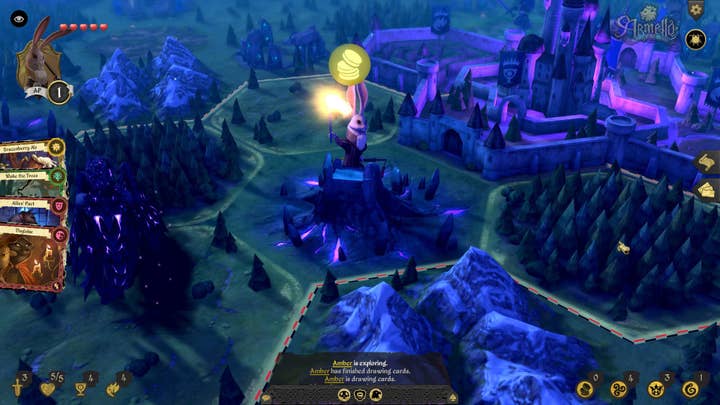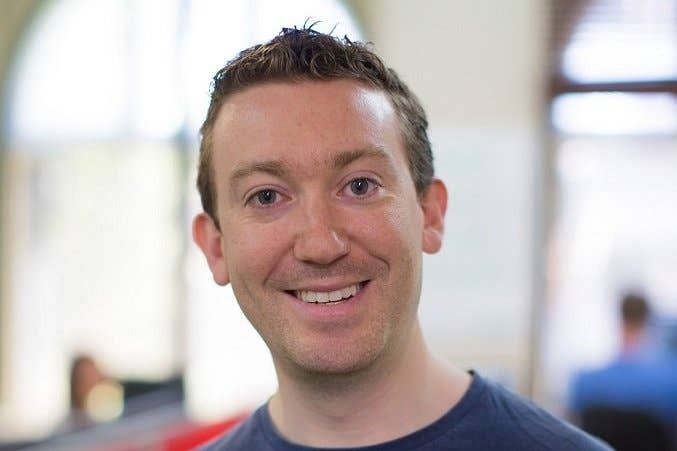Can salary gamification really work?
League of Geeks has yet to launch its first game, but Blake Mizzi is already calling the Armello studio's profit-sharing plan a huge success
League of Geeks' first game, Armello, doesn't come out on PC and PlayStation 4 until September 1, but the Australian studio's director and co-founder Blake Mizzi told GamesIndustry.biz this week he already thinks of it as "hugely successful." It's not because the Kickstarted digital board game has basically broken even off a Steam Early Access campaign that began in January, or because of the 92 percent positive review rate Armello has on Valve's digital storefront. It's because the game got made at all, proving out an unconventional salary structure for the startup.
At League of Geeks, Mizzi explained, all of the full-time employees make the same base salary. However, the studio also has a "Points System" whereby workers will split half of the profits among themselves after the game is launched.
"What we find motivates people is because they are earning profit share... a lot of people go above and beyond what we ask of them..."
"What we find motivates people is because they are earning profit share and they are having a direct contribution into the success of the project, a lot of people go above and beyond what we ask of them and make it as good as it can be so those profits are maximized."
The broad strokes make it sound a bit like an experiment in socialist game development, but the details are capitalistic to their core. At the outset of development, Mizzi and a handful of the studio's senior developers scoped out the project, listed all the tasks that need to be completed, and assigned each a certain number of points based on how long they would expect it to take a skilled developer to accomplish it. Work has to be submitted into a build of the game and approved by leads and other members of the team before a developer actually receives the designated points. What's more, developers are responsible for maintaining those tasks and addressing any bugs that crop up in their work later on. The relative number of points each developer has when the profits start coming in determine the ratio at which the employees' half of the money will be split.
There's another wrinkle, in that employees only earn points if they're forfeiting their salaries. On days when they take a salary, the points that would have been earned are lost. On days when they don't earn the standard wage, they get points for their work. They can also take on tasks after-hours in order to earn additional points.

"We've left it up to everyone to decide where they want to stand," Mizzi said. "We're trying to be as open and transparent to everyone as we can."
When asked if it amounts to the gamification of salaries, Mizzi conceded, "It absolutely is. And that wasn't our intention. The real core motivation behind this was just to design the fairest system we could. We just wanted a profit-sharing system that everyone could feel really comfortable getting behind."
In addition to creating a system that fairly compensated developers, Mizzi said the goal of the Points System was also to allow the start-up studio to keep initial overhead at a reasonable level.
"We also wanted to keep the team small and bring on people we couldn't afford to pay. I'm talking really top-tier talent."
"We realized with our small budget in cash, we could afford to cover X amount of time and X amount of marketing resources, and the rest we would have to bring on by other means," Mizzi said. "We also wanted to keep the team small and bring on people we couldn't afford to pay. I'm talking really top-tier talent."
In other countries, giving key recruits equity in the company is a good way to do just that. But in Australia, employees compensated with share options of the company have been required to pay taxes on the potential profit of those shares in advance, a legal requirement which has significantly impacted the country's start-up scene. (Those laws were very recently amended.)
Obviously, this plan could greatly impact the culture of a studio. For one thing, it can create resistance to hiring new people. When everyone's share of the profits is determined relative to the rest of the team's productivity, more people means a smaller slice of the pie for each individual. Mizzi said League of Geeks has been mindful of that concern, carefully vetting new people as they bring them on. He said between 20 and 30 developers have actually started work at League of Geeks only to leave before they've ever completed a task, a trend with a significant cost attached.
"We're getting better," Mizzi said. "We haven't got it mastered, but we're getting better at picking the people we work with... We've been very careful about developers who just see dollar signs in their eyes, who hear about our system and just want to earn points to earn that profit share. We really try to reach out to people who want to join because they love Armello and have a passion for the game, obviously who are skilled at what they do, and the profit is secondary in their motivation."
"We've almost never once had anyone come and say to us, 'I have to be paid more.' Because everyone can see their profit points. Everyone can see the velocity they're earning them."
The plan has also had some perhaps surprising benefits. Mizzi has particularly enjoyed the way it negated social stigmas about employees discussing their pay.
"By having it transparent, it just takes the discussion out of the room," Mizzi said. "It's not a talking point anymore; it's just out there. It just stops there straight away. It's actually really refreshing."
Another knock-on effect is that a system without secrecy tempers pay disputes almost before they start.
"We've almost never once had anyone come and say to us, 'I have to be paid more.' Because everyone can see their profit points," Mizzi said. "Everyone can see the velocity they're earning them. They can see if they're earning them slower or faster than someone else. It's just apparent the other person is either better than them, or more efficient in their work. It just sort of erodes any of those arguments."
On the more predictable side of things, League of Geeks' profit-sharing scheme makes people more invested in the decision-making process, in every sense of the word.
"If I go to make a decision about the game design that the rest of the team doesn't agree with or they think is going to damage the game, everyone jumps out of their chairs."
"If I go to make a decision about the game design that the rest of the team doesn't agree with or they think is going to damage the game, everyone jumps out of their chairs," Mizzi said. "It's fantastic, because everyone's trying to protect our baby. And it is everyone's baby now. It's really remarkable. It's a beautiful culture around building this game, pushing forward. Everyone's opinion counts. It's not design-by-committee; there's real care by everyone. We're carefully considering and debating out, 'Is this a good feature? Is it worth the time we're investing in it? Is it worth the points we're about to allocate to someone to do this task?' Those are discussions we have every other day about the game. And I think it's great to have those discussions around time, value, and worth for the tasks involved in the game."
Mizzi expects the intensity of those discussions to ratchet up a bit as the team decides on its next project. He definitely wants to keep using the profit-sharing system, but is considering reducing or increasing the profit-share amount that will be split by the team on future titles, depending on how it goes with Armello.
Right now there's a core team of about a dozen developers at League of Geeks, with a group of about 20 contributors. Going forward, Mizzi would like to see those numbers grow. He believes the profit-sharing plan is a scalable one, but expects his biggest challenge will come in maintaining the studio's culture as he brings in new hires. But that's a problem for the future. Right now, he still has a game to launch.
"We just have to launch Armello and see how it goes," Mizzi said. "By our conservative estimates, I don't think it's going to be a disaster, so I'm pretty happy talking to you. It's just [a question of] how much of a success it's going to be."

